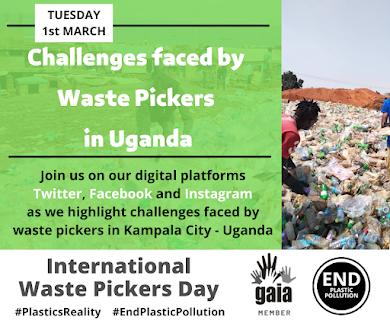WHAT DOES THE NATIONAL ENVIRONMENT ACT SAY ON EXTENDED PRODUCER RESPONSIBILITY?
A clean and healthy environment is every ones priority and should therefore be treated as everyone’s responsibility.
Protecting the environment is not an alternative to economic growth; rather, it is a precondition of efficient economic development as provided for in the national objectives on the 1995 constitution of Uganda.
Extended Producer Responsibility is a concept where manufacturers and importers of products should bear a significant degree of responsibility for the environmental impacts of their products throughout the product life-cycle, including upstream impacts inherent in the selection of materials for the products, impacts from manufacturers’ production process itself, and downstream impacts from the use and disposal of the products.
Producers accept their responsibility when designing their products to minimize life-cycle environmental impacts, and when accepting legal, physical or socio-economic responsibility for environmental impacts that cannot be eliminated by design.
The national environment act provides for the extended producer responsibility and there under; A person who develops, manufactures or processes a product shall, in accordance with section 98 of the Act and Regulations, be responsible for :-
- use of best available technology and process design that maximizes resource efficiency, and applies the waste management hierarchy in the production processes for the product.
- monitoring the product cycle from beginning to end, to prevent mixing of waste and
- take-back of the product after its sale or use for environmentally safe treatment or disposal.
The responsibility for take-back of products extends to a product steward who imports, distributes, sells a substance, a preparation or other product.
The product steward is mandated to establish and operate collection schemes and provide information for the effective return and collection of product waste.
The national environment act further provides that products that may be taken back include; consumer goods past shelf life, off specification products, products that are no longer needed by the user, discontinued products, restricted or prohibited products, glass, plastics, ceramics and associated waste and electrical and electronic products destined for disposal.
The Guidelines for take-back of products by stakeholders and lead agencies and other
Relevant stakeholders may issue guidelines for :-
- Take-back of products, including the management of collection centers and collection schemes and application of production technologies or process designs that prevent or minimize the generation of waste.
- Management of Plastics and Associated Waste.
- Prohibition of importation, sale and use of plastic bags and other plastics used for packaging.
- The national environment act further provides that a person shall not import, export, manufacture, use or re-use plastic carrier bags or plastic products made of polymers of ethane (polythene) and propylene (polypropylene) .
- The management of plastic waste shall take into account the hazards that the waste presents to human health and the environment.
- Duty to minimize plastic waste.
In Uganda the effectiveness of the EPR has been down degraded by various stakeholders such as the various companies, the regulatory authorities, and investors all in disguises of trying to create a circular economy.
Soft drink companies such as Coco-cola continue to package there various brands in plastic bottles which end up in water bodies, drainage systems, to make matters worse the re-cycling of such plastic waste is at a very low-level compared to the production rates, all these are happening while the legal enforcement authorities cannot do anything to enforce the laws that are actually in place.
One would conclude that the EPR policy in Uganda is mainly a sham since the local person cannot complain of the long term effects that the environment shall face, climate change is another global issue that poor waste management has created.
Small scale companies, factories, industries continue to package products in plastic materials yet there do not have capacity to recycle or even collect the packaging material after end use.
In the end, The feasibility of the EPR policy is one that can be attainable only if the economic interests of various stakeholders consider having a healthy environment strategic framework that enables carrying on business with sustainable mindsets and goals for the future. EPR policies have been successful in some countries, Uganda is not any different.




